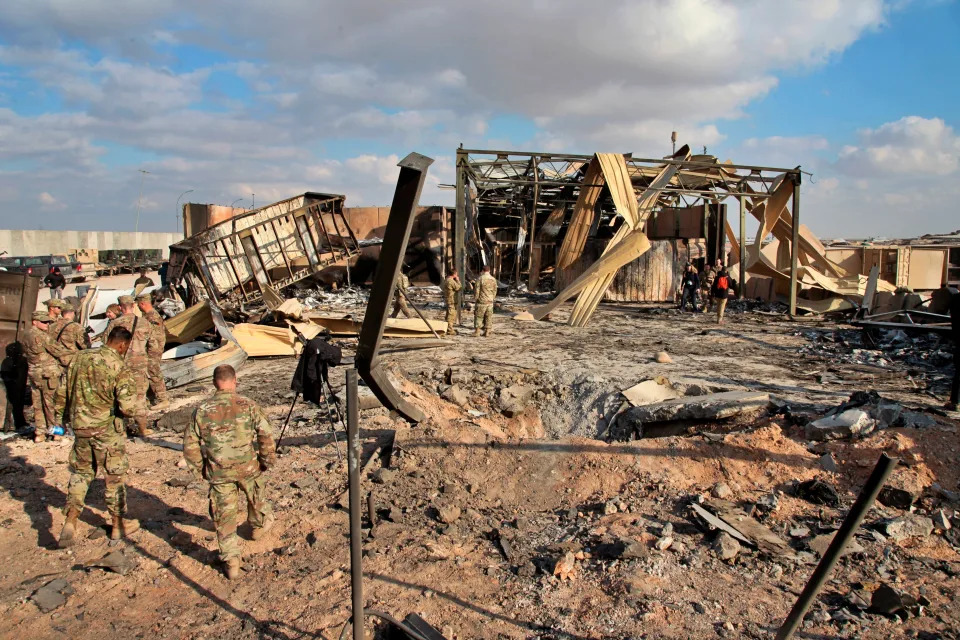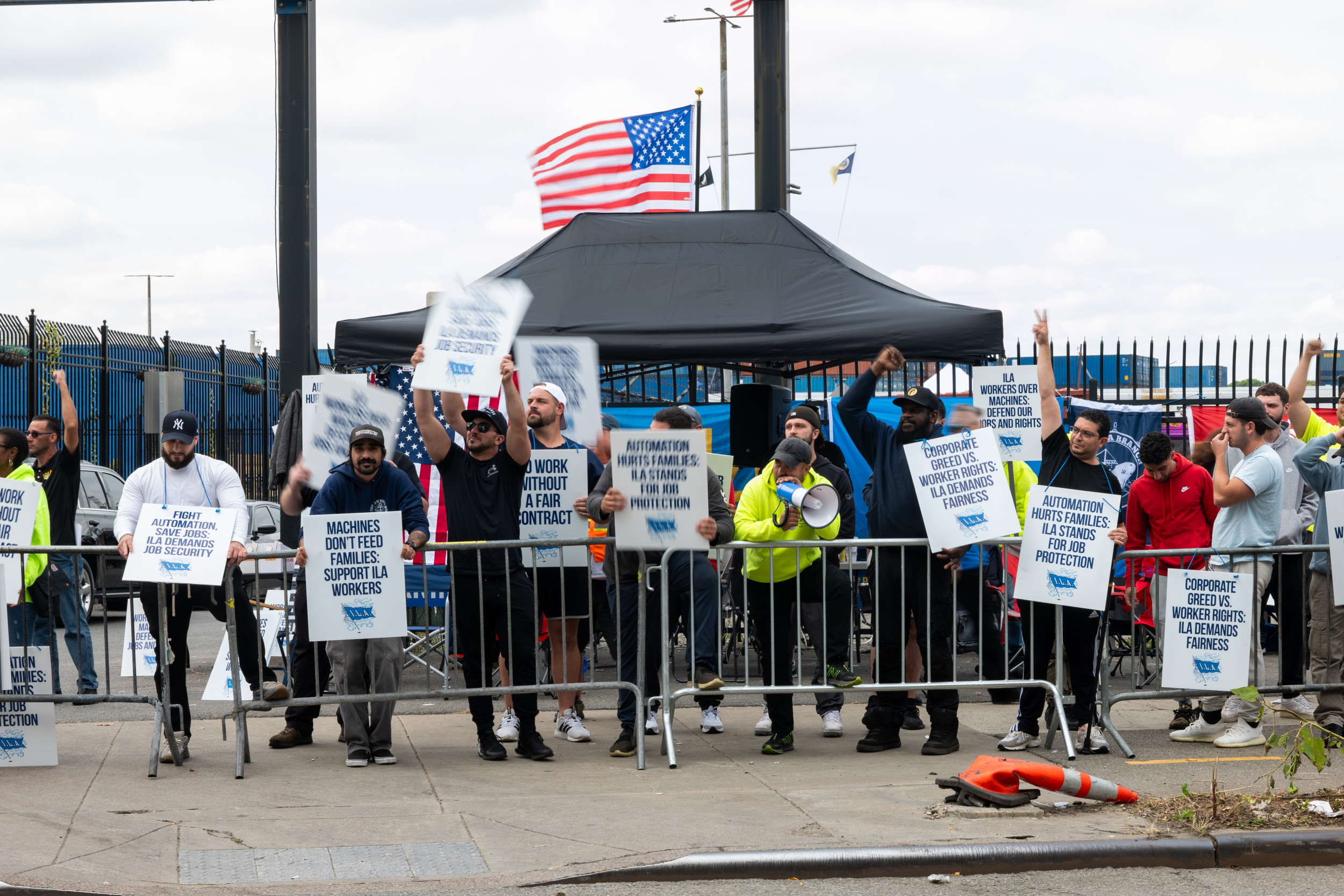Jennifer Bendery
Wed, October 2, 2024
WASHINGTON — Former President Donald Trump’s defense secretary, Mark Esper, on Wednesday pushed back on Trump’s claims that the dozens of U.S. troops who sustained traumatic brain injuries in a 2020 ballistic missile strike in Iran just had “headaches.”
“That’s obviously not accurate,” Esper said flatly in a CNN interview.
The former defense secretary recalled the events of the attack, which took place on Jan. 8, 2020, when Trump was president. At least 109 U.S. soldiers were injured after Iran dropped missiles on the Al-Asad Airbase in Iraq.
“Our troops defended extraordinarily well,” said Esper. “But over time we came to learn, as troops did self-reporting … that we had I think dozens, over 100 cases reported, and several were very serious traumatic brain injuries.”
His comments come a day after Trump scoffed at the idea that any American troops were injured in the 2020 attack. The Republican presidential nominee was asked about it during a campaign event in Wisconsin, in light of Iran launching missiles at Israel earlier Tuesday.
“So, first of all, ‘injured.’ What does injured mean? Injured means, you mean, because they had a headache?” Trump said to a reporter. “Because the bombs never hit the fort.”
After claiming “there was never anybody tougher on Iraq” than him — and mixing up Iraq with Iran — Trump appeared ruffled by the idea that he wasn’t “tough enough” on Iran at the time and boasted that none of Iran’s missiles hit the fort that day.
“They all hit outside, and there was nobody hurt other than the sound was loud, and some people said that hurt, and I accept that,” he added.
Trump similarly dismissed how badly U.S. troops were injured in the weeks after the Jan. 2020 attack, saying the Americans hurt that day “just had headaches.”
A traumatic brain injury, which is caused by an outside force like a powerful bump or blow to the head, is nothing like a regular headache. Some types can lead to short-term problems with brain function, like how a person thinks, acts or communicates. More serious cases can lead to severe disabilities and even death.
Esper said Wednesday that traumatic brain injuries are “a new harm” the U.S. military has come to understand better from the wars in Afghanistan and Iraq. He recalled visiting a soldier at a military hospital a couple months after the Iranian attack and listening to his experience, calling it “quite a traumatic night.”
“Large blasts, much like were experienced in the ballistic missile attack in Al-Assad, can create traumatic brain injuries,” he said. “They’re unseen, if you will, casualties of war.”
Trump got it wrong on a past Iranian missile attack and again cast aside the US troop injuries as nothing more than headaches
Chris Panella
Wed, October 2, 2024
Trump recently got the details of a 2020 Iranian missile strike on US forces wrong.
He also again downplayed the resulting traumatic brain injuries of more than 100 US service members.
The former President has repeatedly dismissed the TBIs as "not very serious" or just "headaches."
Following Iran's massive ballistic missile strike on Israel, former President Donald Trump found himself discussing the 2020 Iranian attack on US forces in Iraq. He botched the details and again downplayed the injuries it caused for over 100 US service members.
The former president has repeatedly dismissed the traumatic brain injuries suffered by US forces as "not very serious" and just "headaches," trivializing what can be serious ailments.
During a press conference on Tuesday, the former president and current Republican presidential nominee said that the "bombs never hit the fort," apparently referring to the two Iraqi bases where US troops were stationed at the time.
Trump also dismissed the injuries to US soldiers caused by the attack, asking: "What does injured mean? You mean because they had a headache?" And in response to a question on whether he should have "been tougher on Iran" in the wake of the strike, he said there was "nobody ever tougher on Iraq."
Iran's missiles did, in fact, strike US positions in Iraq. The attack, which was in response to the killing of Iranian Gen. Qasem Soleimani, was the largest ballistic missile attack ever against US forces abroad. There's visual evidence of the destruction.

US soldiers standing at the spot hit by Iranian strikes at Ain al-Asad air base, in Anbar, Iraq.AP Photo/Qassim Abdul-Zahra
Trump's inaccurate comments on the injuries echo his previous stance on the over 100 US service members who were diagnosed with traumatic brain injuries after the attacks.
Not long after the attack, Trump told reporters that he "heard that they had headaches and a couple of other things," but his view was that it wasn't serious.
"I don't consider them very serious injuries relative to other injuries that I've seen," he said.
At the time of the 2020 strike, brain injury experts and former US service members told Business Insider about the injuries, saying that Trump's comments trivialize the severeness of the conditions, which can be slow to appear and can be debilitating.
One former Vermont Army National Guard infantryman who was deployed to Afghanistan in 2009 and suffered a mild TBI in combat told BI that over 10 years later, he still was still waking up with headaches every day, experienced concentration issues, and occasionally had dizzy spells.
Any brain injury, such as a TBI, can leave injured patients with troubling physical, cognitive, emotional, and behavioral issues, some of which may last their entire lives.
Trump's downplaying on the injuries also ran at odds with the Pentagon, which, in January 2020, acknowledged the potential ongoing issues for service members and said it would "monitor them the rest of their lives and continue to provide whatever treatment is necessary."
Some of the US service members affected by the attack were later awarded the Purple Heart for their involvement in the attack, but initially, they were denied. One service member who was affected by the Iranian attack told CBS News a few years ago that he was struggling with vision problems, memory loss, constant headaches, and hearing issues.

Iran's attack on Israel was in response to the killings of a Hezbollah and Hamas leader.REUTERS/Amir Cohen
In response to Trump's comments on Tuesday, Minnesota Gov. Tim Walz, a National Guard soldier and the present Democratic vice presidential nominee, said during the vice presidential debate with Republican nominee Ohio Sen. JD Vance that Trump "wrote off" the troops' injuries as "headaches."
Trump's comments about the 2020 strike came on the heels of Iran's massive missile strike on Israel, which involved over 180 ballistic missiles. US and Israeli officials said the significant attack was largely intercepted and "ineffective," with Israel vowing to respond.
In response to the attack, Vice President Kamala Harris said that while "we are still assessing the impact," the "initial indications are that Israel, with our assistance, was able to defeat this attack." She said "our joint defenses have been effective."
Charisma Madarang
Tue, October 1, 2024

Donald Trump once again showed his disdain for United States military personnel during a campaign event in Milwaukee on Tuesday.
When taking questions from reporters during the event, a journalist asked Trump if he thought Israel should retaliate against Iran’s Oct. 1 missile attacks against the nation. The reporter also asked if Trump believed he should have been “tougher on Iran” during his presidency “after they had launched ballistic missiles in 2020 on U.S. forces in Iraq,” which left “more than 100 U.S. soldiers injured.”
The Republican candidate bristled at the idea of taking accountability for the tragic event, and instead mocked U.S. troops. “What does injured mean?” he retorted. “Injured means, you mean, because they had a headache? Because the bombs never hit the fort.”
“There was nobody ever tougher on Iraq,” Trump continued, confusing Iraq for Iran. “When you say not tough, they had no money. They had no money for Hamas. They had no money for Hezbollah. And when we hit them, they hit us. And they called us, and they said, ‘We’re going to shoot at your fort, but we’re not going to hit it.’”
The former president proceeded to insult the journalist, while downplaying the injuries sustained by troops. “If you were a truthful reporter, which you’re not, you would tell the following: None of those very accurate missiles hit our fort,” he said. “They all hit outside, and there was nobody hurt other than the sound was loud and some people said that hurt, and I accept that.”
Minnesota Gov. Tim Walz appeared to reference Trump’s comments later on Tuesday night during the vice presidential debate. “When Iranian missiles did fall near U.S. troops and they received traumatic brain injuries, Donald Trump wrote it off as headaches,” he said.
In 2020, the Defense Department confirmed that 109 U.S. service members were diagnosed with traumatic brain injuries after Iran attacked the Ain al-Asad air base in Iraq. At the time, Trump appeared to dismiss the severity of the injuries and said, “I heard that they had headaches and a couple of other things, but I would say, and I can report, it is not very serious.”
Trump’s remarks on Tuesday follow his long history of insulting U.S. military. In August, Trump drew backlash from veterans groups when he said the Presidential Medal of Freedom is better than the Congressional Medal of Honor because the former doesn’t involve sacrifice. The 2024 candidate later doubled down on those comments.
Later that month, when visiting Arlington National Cemetery, Trump treated the burial grounds as a political campaign opportunity despite federal laws expressly barring such behavior. Trump and his campaign staff received widespread criticism “verbal and physical altercation” that reportedly took place during a wreath-laying ceremony when Trump’s staffers tried to enter an area reserved for recently deceased service members. The Army confirmed that someone from Trump’s team “abruptly pushed” a cemetery staffer.
The Republican hopeful attempted to blame the incident on the Gold Star families, not his campaign, who distributed images and videos of him at Arlington National Cemetery.
Trump downplays troop injuries in 2020 missile strike: ‘You mean because they had a headache?’
Brett Samuels
Tue, October 1, 2024
Former President Trump on Tuesday dismissed injuries sustained by U.S. troops during a 2020 Iranian missile strike on an Iraqi base as he argued he has been tougher than the Biden administration on Tehran.
Trump fielded questions from reporters during a campaign stop in Milwaukee and was asked by one journalist whether he should have responded more strongly to Iran after it launched missiles at U.S. forces stationed at a base in Iraq in 2020, leaving dozens with traumatic brain injuries.
“So first of all, injured. What does injured mean? Injured means — you mean because they had a headache? Because the bombs never hit the fort,” Trump said.
“So just so you understand, there was nobody ever tougher on Iraq,” Trump continued, saying Iraq instead of Iran. “When you say not tough, they had no money. They had no money for Hamas. They had no money for Hezbollah. And when we hit them, they hit us. And they called us, and they said, ‘We’re going to shoot at your fort but we’re not going to hit it.'”
“And if you were a truthful reporter, which you’re not, you would tell the following: None of those very accurate missiles hit our fort,” he added. “They all hit outside, and there was nobody hurt other than the sound was loud and some people said that hurt, and I accept that.”
More than 100 U.S. service members suffered traumatic brain injuries in January 2020 as a result of an Iranian missile strike on an Iraqi base, according to Department of Defense officials.
The missile strike on the Iraqi airbase was in retaliation to Trump ordering the drone strike that killed Iranian Gen. Qassem Soleimani in early January 2020.
Trump similarly downplayed the injuries at the time, saying he had “heard that they had headaches and a couple of other things.”
The former president spent part of his campaign swing through Wisconsin on Tuesday criticizing the Biden administration’s foreign policy in the wake of Iranian missile attacks against Israel.
Trump, who withdrew from the Iran nuclear deal and reimposed sanctions on Tehran during his first term, told reporters in Milwaukee there was “nobody ever tougher on Iran” than he was.
Copyright 2024 Nexstar Media, Inc.
Trump Shrugs Off U.S. Soldiers’ Traumatic Brain Injuries as ‘Headaches’
William Vaillancourt
Tue, October 1, 2024

YouTube
Donald Trump on Tuesday again downplayed dozens of U.S. soldiers getting traumatic brain injuries from Iranian airstrikes under his watch, telling a reporter dismissively that “they had headaches.”
In Milwaukee, Wisconsin, Trump was asked about the January 2020 airstrikes near U.S. forces in Iraq, in light of how Iran launched a missile attack against Israel earlier Tuesday.
“Do you believe that you should have been tougher on Iran after they had launched ballistic missiles in 2020 in Iraq, leaving more than 100 U.S. soldiers injured?” the reporter asked, referencing Iran’s response to the U.S. drone killing of Iranian Revolutionary Guard Gen. Qassem Soleimani.
“So, first of all. Injured. What does injured mean? Injured means—you mean, because they had a headache? Because the bombs never hit the fort?” he said.
“Just so you understand: There was never anybody tougher on Iraq,” Trump continued, confusing the site of the strikes with the country behind it.
Trump Demands Biden Remove Ad of Him Calling Dead Soldiers ‘Suckers’ and ‘Losers’
Tuesday wasn’t the first time Trump has minimized those troops’ injuries. A few weeks after the strikes, Trump falsely claimed that “no Americans were harmed.” According to the Defense Department, 109 troops had suffered traumatic brain injuries.
In Tuesday night’s vice presidential debate, Minnesota Gov. Tim Walz alluded to Trump’s history of shrugging off the fallout from the strikes.
“When Iranian missiles did fall near U.S. troops and they received traumatic brain injuries,” he said, “Donald Trump wrote it off as ‘headaches.’”





 A container ship departs the Port of Newark for the Atlantic Ocean on September 30, 2024. Unionized port workers from Maine to Texas have walked off the job. Spencer Platt/GETTY
A container ship departs the Port of Newark for the Atlantic Ocean on September 30, 2024. Unionized port workers from Maine to Texas have walked off the job. Spencer Platt/GETTY




